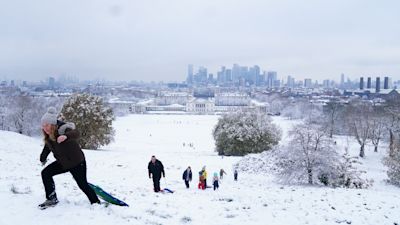Explainer
How long is this cold weather due to last - and is more snow on the way?

We've just entered the second week of freezing temperatures across the UK.
Thousands this morning woke up to a winter wonderland, with some unofficial reports of 10-12cm of snowfall for parts of Kent and north London.
A number of schools were closed on Monday morning, flights have been cancelled from Heathrow, Stansted and Luton airports due to snowfall on Sunday night and persisting freezing fog.
Further wintry hazards for snow, sleet, ice and freezing fog are likely over the coming few days as temperatures continue to struggle to rise above zero.
Stay up to date with the latest weather warnings from the Met Office here
How cold has it been so far?
Arctic air has been across parts of the UK for a number of days now, meaning temperatures underneath clear skies have been plummeting away overnight.
On Sunday night, temperatures fell to -15.7 Celsius at Braemar in Aberdeenshire making it the coldest night of the year so far and the lowest temperature since 11th February 2021.
Northern Ireland also experienced it's coldest night of the year as temperatures here fell to -8.7 Celsius at Katesbridge, County Down.
But it wasn't just the temperatures, some places also saw their first significant snowfall of the season.
Particularly, parts of southeast England have had a number of unofficial snow depth reports of 10-12cm. Meanwhile officially, Andrewsfield in Essex reported 9cm and Charlwood, Surrey saw 5cm on Monday morning.
How long will the cold weather last?
As we look ahead for the rest of this week the cold weather is here to stay.
A northerly airflow remains in control meaning the air will continue to stream in from the Arctic until Sunday when temperatures will start to recover.
Wintry showers will mainly affect parts of northern Scotland and further showers will push down eastern and western coastal areas of the UK. These will fall as rain and sleet closest to the sea, but as snowfall further in land.
Despite saying this, many central and southern areas through the week ahead will stay dry - a normal set up for the UK in a northerly wind direction.
Where the snowfall has occurred this will melt during the day and refreeze overnight producing very dangerous driving conditions.
Away from the snowfall, further wintry hazards are expected this week including ice on untreated roads and surfaces, freezing fog and a much colder feel due to wind chill.
Further possible snowfall for the southwest?
Despite the above, there is the risk of some further possible significant snowfall expected for the southwest of England.
During Tuesday night and into Wednesday morning a frontal band of rain will graze the West Country. As it bumps into the cold air this could bring some patchy accumulations of snowfall. 1-3cm at low levels, with 5-8cm above 150 metres.
However, if this feature moves further northwards there is a 20% chance of seeing 5-10cm above 150 metres, with the highest peaks of Bodmin and Dartmoor seeing 15-20cm.
Is it unusual to see this much snowfall in December?
It is more common to see high snowfall totals later in the winter season (January to March), compared to the beginning of December.
This is because the land has significantly cooled through the winter months and colder temperatures are more sustainable and more likely.
The last time we experienced significant snowfall in December was back in 2010.
What is more of a shock to many is how wet and mild November was.
There seems to of been a huge gear change to something much colder in the last week and the longevity of this cold snap in comparison is unusual although not unheard of.
Remember the five P's in cold weather:
People - especially the elderly, if you can please check in on your neighbours and check if they are OK and need anything
Pets - in cold weather, animals that may usually be outside, it's worth considering bringing them inside or ensuring they have somewhere warm to shelter. And don't forget that salt spread on the roads can be irritating to your furry friends paws, remember to rinse them in warm water
Pavements - remember icy paths and pavements are likely so be careful of slips, trips and falls
Pipes - cover your pipes and protect your outside taps from freezing over to help prevent water leaks
Plants - cover and protect cold sensitive plants